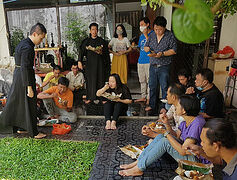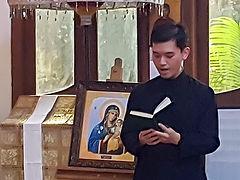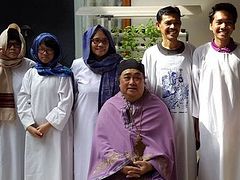On the feast of St. Sergius of Radonezh, we told readers stories of people in whose lives the “Abbot of the Russian Land” participated in a special way. One of the heroes was Geraldio Lau Gefaldo, a translator of the Patriarchal Exarchate in South-East Asia (the Russian Orthodox Church) from Indonesia, who received the name Sergius in Holy Baptism. Today he has shared his story with us: how he learned about Russia, how he converted to Orthodoxy, and what it means to be a Christian in Indonesia.
 Geraldio Lau Gefaldo on the right
Geraldio Lau Gefaldo on the right
—Sergius, tell us how you decided to embrace Orthodoxy.
—I became Orthodox after a fairly long period of studying the faith. At first I was a secular person, almost an atheist. I was fourteen years old. After a while, I came to the conclusion that everyone should believe in some god.
I was comparing different religions of the world then. Why did I choose Christianity? There were many different factors, but the critical one was that in Christianity there is the golden rule, which is mentioned in the Holy Scriptures: “Do unto others as you would have them do unto you.” In other religions there is a similar rule, but it is already the silver (not golden) one: “Don’t do unto others as you don’t want others to do unto you.” And how I became Orthodox is also an interesting story. I could tell it for a long time.
I used to play a computer game where there was information about the Soviet Union. I wondered what kind of country it was, because it was an absolutely new world for me. I was very curious to learn new things and facts. It attracted me. In the process of studying this topic, I learned about Orthodox Christianity. But it was a long time ago, when I was twelve years old, and it didn’t go any further. Then, when I decided to choose a Christian denomination for myself, I suddenly remembered Orthodoxy.
Then I began to compare Orthodoxy with other Christian traditions: Catholicism, Protestantism and others. I used the scientific methods I was taught as a child to understand the differences. I believed that if scientific methods are applicable to the natural sciences and the humanities, then this approach should also be applicable to the study of religion.
—And what eventually became the deciding factor in converting to Christianity? Were you baptized in Russia or at home?
—At the end of August 2015, I found the address of an Orthodox parish in Indonesia through various people, but when I went there, I almost got lost, because the house with the church was situated in the depth of a residential complex and it was hard for me to locate it. But with the help of a guard I did find it.
The doors were closed, and I stood and waited for over two hours. Although according to the schedule that I was given, there was supposed to be the Vigil at that time, since I arrived on Saturday evening. It was closed, but I saw the movement of some shadows through a chink between the door and the floor, as if someone were moving around the church, so I did not leave.
Finally, a car arrived with a man and a woman in it. The man asked me who I was, and I replied that I was interested in Orthodoxy, and asked him if he could show me where the Orthodox church was. He said that I had come to the right address, but the priest who served there was away that day, so there was no service.
The building was an ordinary house that looked nothing like a church. It turned out that that man was its owner, and the priest, Fr. Kirill Siswaja, would come to serve there—that is, it was a house church.
I gave the man my phone number, and a few days later Fr. Kirill wrote to me. I started asking him questions about Orthodoxy. My catechism began. And thirteen months later, on October 16, 2016, I was baptized with the name Sergius after St. Sergius of Radonezh, which was given to me by Fr. Kirill.
 Geraldio Lau Gefaldo on the right
Geraldio Lau Gefaldo on the right
—Had you already known something about St. Sergius?
—I had known about St. Sergius before my Baptism, but it was just in the process of my studying the faith. I had read the Lives of several saints, including St. Sergius of Radonezh, but then there was nothing special about that.
I didn’t know in advance that I would be given this name. Only the day before Baptism did my father-confessor from Indonesia, Fr. Kirill Siswaja, say that I would be named in honor of St. Sergius. But I did not choose this name myself and did not ask for it. It was his choice, with which I agreed.
—Did Fr. Kirill explain why he gave you this name?
—Yes, he knew that I really liked to study different subjects and sciences. I can say that this is my hobby. Fr. Kirill knew that St. Sergius was the patron saint of students, and that’s why he gave me this name.
—When did you first visit the Holy Trinity-St. Sergius Lavra?
—I was baptized when I was fifteen years old, and as far as I remember, it was the eleventh grade. We have such a system in Indonesia that school education lasts twelve years—this is secondary school level.
I first visited the Holy Trinity-St. Sergius Lavra when I went on a pilgrimage with Fr. Kirill and other parishioners from my Surabaya parish. But then we were still part of ROCOR and received the blessing for the trip from Metropolitan Hilarion, who was the first hierarch of ROCOR. It was written in the pilgrimage program that there would be a visit to the Lavra. We stayed for three days in the pilgrims’ hostel in large rooms with bunk beds, and our whole Indonesian delegation was accommodated in one of them. We arrived for the summer feast of St. Sergius in 2018—that is, five years ago.
 Holy Trinity-St. Sergius Lavra
Holy Trinity-St. Sergius Lavra
—It often happens that our patron saints take part in our lives. Do you have any personal story related to St. Sergius? Of course, if you don’t mind sharing it.
—You know, I think that our daily life already has so many small miracles that it is difficult to count them. For example, there is a fact that I didn’t realize until after my Baptism. My father-confessor, Fr. Kirill Siswaja, is a married priest, and his wife’s name is Maria—that is, by Divine Providence my spiritual parents bear the names of the parents of St. Sergius of Radonezh, although they were baptized in honor of Sts. Cyril of Alexandria and Mary of Egypt respectively.
There is another miracle that I think is very important. It is about how I became a translator. I was taught Russian for some time while I was studying in Russia, but by the time I was assigned the duties of a translator, I had not spoken Russian for a year and a half. I thought I had already lost my knowledge and would no longer be able to speak this language anymore. I believed it was the end of my work with this language. But it turned out that after I had started working as a translator in the church, I regained all my knowledge.
I left Russia at the end of 2019, started working at the Exarchate in early 2022, and then returned to Russia in the summer of the same year. So my Russian friends and I met a few years later, and they noticed that my Russian language had become much better. Although before working at the Exarchate I had spoken only Indonesian and lived my normal life. I regard it as a miracle of my patron saint.
 Geraldio Lau Gefaldo on the left
Geraldio Lau Gefaldo on the left
I believe that we should thank God for all the miracles that occur in our lives, even the smallest ones. I can talk about it for hours. I am very grateful to God that I have the opportunity to come to know the course of Orthodox worship and understand it, although it is not easy, and I would even say that it is hard. Now I have such a good understanding of the service, which helps a lot in the mission. In addition, I learned Church singing. I think that’s a miracle too.
I should emphasize that I have no formal education in Church singing or liturgics, but in Indonesia I sing and help adapt Indonesian words to Church Slavonic melodies.
—I know that you speak Russian, Indonesian and English. Do you know any other foreign languages?
—Yes, I really like picking up languages, this is my hobby. I know Russian, Indonesian, English, and I used to study French and Dutch. I am currently studying Chinese and Japanese. But the first three that you mentioned are the most convenient for me in communication.
—I think it is providential that you have become a translator at the Exarchate, headed by Metropolitan Sergei (Chashin)!
—Yes, I agree. This is definitely Divine Providence.




